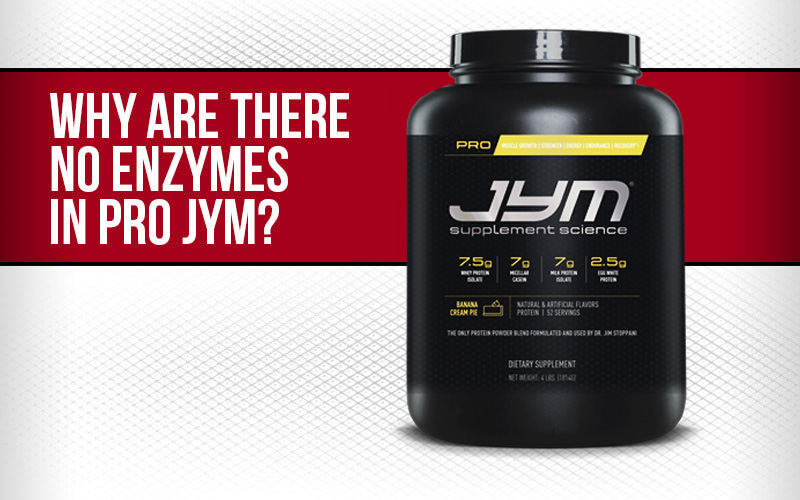WHY ARE THERE NO ENZYMES IN PRO JYM?
Read the REAL truth about digestive enzymes!

Read the REAL truth about digestive enzymes!

If you look on the Supplement Facts Panel and Ingredients List of Pro JYM, you will notice that I didn't bother to add any enzymes, specifically proteases that work to digest protein.
Some of you may be shocked to find that I failed to include protease enzymes in my high-quality Pro JYM protein-powder blend. After all, everyone knows how important enzymes are for digesting protein, right? Wrong! If you're surprised that my Pro JYM lacks digestive enzymes, then you will likely be even more surprised to hear that the science on digestive enzyme supplements is almost non-existent.
Not Much Science To Digest
Except for the clinical use of prescription enzymes for those with pancreatic insufficiency, and the use of lactase for those who are lactose intolerant, the research on digestive enzymes and their ability to aid food digestion and nutrient utilization in normal, healthy subjects, is very scarce and unreliable.
There is so little science on this category of supplements that it's actually quite scary when you consider how many enzyme supplements there are on the market and how many people assume that they need them.
There are basically two documented studies on enzyme supplements and digestion that I am aware of. Yes, only two! The first study was done in 1999 at the Minneapolis Veterans Affairs Medical Center. They fed subjects a meal of cookies with placebo pills or with enzyme pills containing lipase, protease and amylase (for fat, protein and carbs, respectively).
The subjects taking the enzyme pills reported less bloating, gas and fullness than those taking the placebo pills. The two main problems with this study: 1) the enzyme pill used was a prescription enzyme product and 2) the researchers didn't actually make any true measures of digestion. All that they recorded were the subjective measures of gas, bloating and fullness reported by the subjects. That hardly is considered science.
The only other study on digestion and enzymes investigated the influence of taking protease enzymes with a protein powder. This study did actually measure digestion of the protein, but the study was funded by the manufacturer of the enzyme supplement used.
Could that influence the outcome of the study? I'll let you make your own decision on that one. This was done on the patented protease enzyme supplement Aminogen from Triarco Industries. They reported that when they supplied subjects with 50 grams of whey protein concentrate after an overnight fast, with Aminogen or without, the Aminogen supplement increased the rate of digestion of the whey.
Now I might be able to accept the data from this study showing that supplying a protease enzyme with a large dose of whey protein concentrate could increase the rate of digestion of the whey protein. But what I really question is whether or not this actually offers any true benefit. I should also mention that this study was done in 2008. That's back when most scientists still thought that whey protein by itself was the most anabolic protein due to its rapid digestions rate.
The newer research on protein powders finds that going faster with the digestion rate of whey is not the way to go. Going slower with the digestion rate of the protein is actually your best bet for better gains in muscle protein.
Research studies are show that using a blend of fast-digesting whey and slow-digesting casein protein, plus a medium-digesting protein such as soy or egg, works significantly better than whey protein alone at prolonging muscle protein synthesis and increasing net protein balance (how much of that protein is retained and put into muscle building), as well as leading to bigger gains in muscle mass.
The problem with using whey alone is that its fast digestion rate is the main benefit, but also the main downfall. Whey's fast digestion rate is important for spiking muscle-protein synthesis, but it also causes the spike in protein synthesis that it initiated to rapidly drop.
Yet when you consume a little bit of whey along with more slower-digesting proteins, the whey spikes the muscle-protein sysnthesis and the slower proteins maintain that higher protein synthesis for longer. This leads to greater muscle growth. So given what the new science is now showing in the lab, as well as what I am seeing in the gym, it makes no sense to further speed up the rate of whey protein, or any protein for that matter. This is also why I didn't bother to include any hydrolyzed whey protein in Pro JYM. Hydrolyzed whey protein is whey protein that has been predigested so that it digests a bit faster than whey protein isolate. Yet as I said, there is no point in further speeding up the rate that whey protein isolate digests at. It's fast enough. The better strategy is to complement whey protein isolate with medium- and slow-digesting proteins.
To read more on the science of why protein blends are better than whey alone, click on the link below:
http://jymsupplementscience.com/protein-blends-are-best/
Despite what I said above, the researchers in the Aminogen study did report that nitrogen retention was increased better when the subjects consumed the Aminogen with the whey. Nitrogen retention is a measure of how much of the protein is put to use in the body versus it being excreted.
This data I have a hard time fully accepting. This is mainly due to the newer studies that I discussed above showing that adding slower digesting proteins to whey protein actually increased muscle protein synthesis for longer and led to greater net protein balance and muscle growth.
Given all the new science, speeding up the digestion rate of whey protein does not seem like the way to go for greater nitrogen retention. I have to really question this finding from the Aminogen study. Plus, there has yet to be a follow up study to this one that was performed many years ago. When there is a lack of supporting studies to follow up one single study, you have to take the data with a grain of salt.
The only follow-up study done on Aminogen was a safety study done in 2013 that investigated the effects it had on liver and kidney function, metabolism, and cardiovascular health. They reported no adverse effects of Aminogen on any of these measures. Fair enough. However, they also reported that the subjects consuming 40 grams of whey protein concentrate without the Aminogen for 30 days experienced a significant increase in total and LDL (bad) cholesterol, yet the group taking Aminogen with the whey protein did not experience any negative rise in cholesterol.
Hold up a minute! Whey protein raised cholesterol levels?! If you look at the research on whey protein and cardiovascular health over the years, you would find that taking whey protein does NOT raise cholesterol levels. In fact, you would find quite the opposite. Whey protein has been shown in numerous studies to provide heart-health benefits, including a lowering of cholesterol and blood pressure.
So the data from this Aminogen safety study is highly questionable. And that does not leave me very confident in the data from either one of the Aminogen studies. Which bring us back to the point that I was making at the start of this article – there is no real research on enzyme supplements and their benefit in the digestion and utilization of protein. Period!
Pro JYM Power
So given that there is zero reliable data on protease enzymes, and the fact that increasing the digestion rate of whey protein offers no true benefit, I did not bother to include them in Pro JYM. Plus, including enzymes in Pro JYM would potentially increase the digestion rate of the slow-digesting micellar casein and the medium-digesting egg protein. That is the LAST thing that you would want to do in a protein powder blend.
You want the slow-digesting protein to be as slow digesting as possible. Speeding up the digestion rate of casein is counterproductive. In fact, if you see digestive enzymes added to any protein powder blend, then you know that the formulator had no idea what they were doing. They simply added the enzymes just because they are popular and hoped that it would increase the sales of the product.
Besides providing no proven benefits, another problem with adding digestive enzymes to a protein powder is that they leave a nasty aftertaste that's hard to mask. If you have already tried Pro JYM, then you know that its taste is unrivaled by any other protein powder and it treats you well in the gastrointestinal department.
If you haven't tried Pro JYM, then prepare to be blown away by the highest quality protein powder ever developed that includes all the critical ingredients you need, avoids any unnecessary and/or counterproductive ingredients, delivers unparalleled results, is the absolute best-tasting protein powder that you have ever tried, and leaves you with no stomach discomfort. In fact, even those who are lactose intolerant have zero stomach issues with Pro JYM. That's because each serving of Pro JYM has less than 1 gram of lactose to avoid such stomach issues.
One of the many things that sets JYM Supplement Science apart from the rest of the supplement industry is the selection of ingredients that I use in each JYM product. I don't choose ingredients just because they're popular buzz words and are supplements that people think they need. I only use ingredients that have a proven track record in the lab and in the gym ... my own gym.
I also use ingredients that provide a true synergy when used together with the other ingredients in the product. That is a science that no laboratory scientist can duplicate. It's part science and part art form, and is an ability that I have developed over decades of studying supplements in the lab and in the real world. And the results speak for themselves.
Here's a video I did on this same topic:
References:
Suarez, F., et al. Pancreatic supplements reduce symptomatic response of healthy subjects to a high fat meal. Dig Dis Sci 44(7):1317-1321, 1999.
Varayil, J. E., et al. Over-the-Counter Enzyme Supplements: What a Clinician Needs to Know. Mayo Clinic Proceedings Jul 31, 2014.
Oben, J., et al. An open label study to determine the effects of an oral proteolytic enzyme system on whey protein concentrate metabolism in healthy males. J Int Soc Sports Nutr 24;5:10, 2008.
Anderson, M. L., et al. A Double-Blind Clinical Study to Investigate the Effects of a Fungal Protease Enzyme System on Metabolic, Hepato-renal, and Cardiovascular Parameters Following 30 Days of Supplementation in Active, Healthy Men. Food Dig 4(1):19-25, 2013.
Bortolotti, M., et al. Effects of a whey protein supplementation on intrahepatocellular lipids in obese female patients. Clin Nutr 30(4):494-8, 2011.
Pal, S., et al. Effects of whey protein isolate on body composition, lipids, insulin and glucose in overweight and obese individuals. Br J Nutr 104(5):716-23, 2010.
Ohlsson, L. Dairy products and plasma cholesterol levels. Food Nutr Res 54, 2010.
Pins, J. J. and Keenan, J. M. Effects of whey peptides on cardiovascular disease risk factors. J Clin Hypertens (Greenwich) 8(11):775-82, 2006.
Related Articles